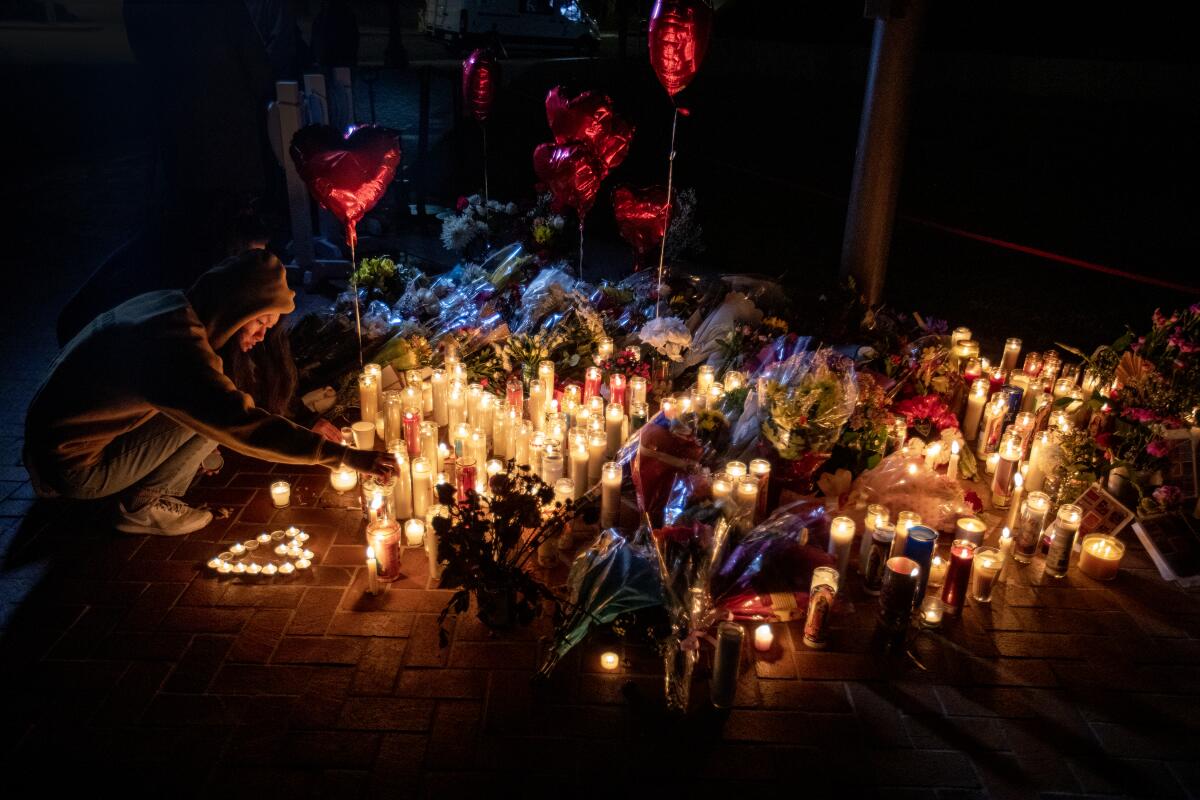California Politics: What’s next for California gun laws?

- Share via
SACRAMENTO — The Times wants to know what you’d like to see in this newsletter. Please take a minute to complete this short survey. I really value your feedback.
What a week it’s been for California.
From Monterey Park near Los Angeles to the town of Half Moon Bay near San Francisco, communities up and down the state have been left reeling from back-to-back mass shootings that claimed at least 18 lives.
“What the hell is going on?” Gov. Gavin Newsom said Tuesday as he responded to the state’s second massacre in three days.
Many Californians probably are asking the same question.
I’m Laurel Rosenhall, The Times’ Sacramento bureau chief, here to share the week’s biggest news about California politics.
What’s next for California gun laws?
California already ranks among the states with the most restrictive gun control laws. And by some measures, Times reporter Hannah Wiley reports, they are working: The state has among the lowest rates of gun deaths, according to the Centers for Disease Control and Prevention, and a report by the Public Policy Institute of California found the state had a lower rate of mass shootings than the national average.
But California’s aggressive laws can do only so much. Several new state gun laws have been eviscerated by the federal courts, and, given the expansive interpretation of the constitutional right to bear arms by the conservative majority of the U.S. Supreme Court, any new laws passed in California could suffer a similar fate.
Still, in the wake of this month’s tragedies, California lawmakers are asking themselves what more they can do. Democrats have introduced bills to ban selling body armor that’s been used by some mass shooters, to tax ammunition to fund violence prevention services and to update the state’s law for carrying concealed weapons. Read more about those proposals in this article.
And don’t miss these takes from Times political columnists:
- National gun regulations are needed, columnist George Skelton argues, such as meaningful background checks and California Sen. Dianne Feinstein’s long-advocated assault weapons ban.
- The political trend that’s led lawmakers to become less reliant on broad support and more beholden to their political bases is a huge factor shaping how the country approaches gun policy, columnist Mark Z. Barabak writes.
Changing of the guard(s)
2023 is not an election year but it’s shaping up to be a jockeying year, with politicians at many levels throwing elbows to get in position for what they hope will be the next big thing:
In the California Assembly, weeks after warring factions of Democrats reached an agreement on a timeline to replace Speaker Anthony Rendon with Assemblyman Robert Rivas (D-Hollister), a new candidate for speaker emerged: Assemblyman Joaquin Arambula of Fresno. Now another round of infighting threatens to consume California lawmakers for the second year in a row, Times reporter Taryn Luna writes.
In the U.S. Senate, it’s become clear that the race among California Democrats for the seat now held by Feinstein is going to be highly competitive. Rep. Adam B. Schiff, a fixture in San Fernando Valley politics who rose to national prominence as a top Democratic foe to then-President Trump, announced this week that he is joining the contest, Times reporter Melanie Mason writes, injecting new fundraising and political heft to California’s marquee race for 2024. Earlier this month, Orange County Rep. Katie Porter launched her campaign and Oakland Rep. Barbara Lee told colleagues she also plans to run.
At the Republican National Committee, mounting frustration over GOP electoral losses have led to a contentious leadership battle that will be decided today in Orange County, writes Times reporter Seema Mehta. San Francisco attorney Harmeet Dhillon, whose clients include Trump, is trying to oust Republican National Committee Chair Ronna Romney McDaniel. Both women are ardent, vocal Trump supporters — a reflection of the grip the former president still has on the party more than two years after losing the White House.
Not so fast!
Some key bills Newsom signed into law last year are struggling on several fronts.
STALLED: A California law seeking to increase wages and improve working conditions for fast-food workers has been put on hold because restaurant trade groups gathered enough valid signatures to force a referendum. Voters will decide next year whether to uphold the law.
BLOCKED: A federal judge in California has temporarily blocked the enforcement of a new state law intended to halt the spread of lies and misinformation surrounding COVID-19. Some sections of the law are written in a way that makes clear interpretation nearly impossible, the judge wrote: “Put simply, this provision is grammatically incoherent.”
CHALLENGED: A coalition of disability and civil rights advocates filed a lawsuit seeking to block the rollout of Newsom’s far-reaching plan to address severe mental illness by compelling treatment for thousands of people. They asked the state Supreme Court to strike down as unconstitutional the program known as CARE Court, arguing that the sweeping new system will violate due process and equal protection rights. A Newsom spokesman said the governor’s plan deals with “the cold, hard reality that something must urgently be done to address this crisis.”
Reminder: Please take a minute to complete this short survey!
Stay in touch
Did someone forward you this? Sign up here to get California Politics in your inbox.
Until next time, send your comments, suggestions and news tips to capolitics@latimes.com.
Sign up for Essential California
The most important California stories and recommendations in your inbox every morning.
You may occasionally receive promotional content from the Los Angeles Times.




